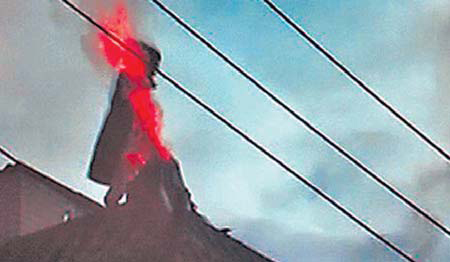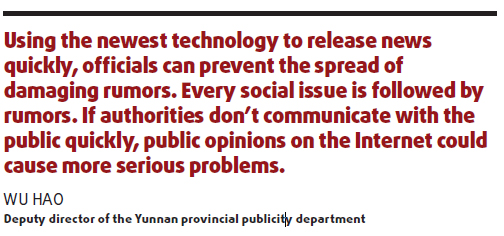Government and Policy
Officials slow in adapting to Internet revolution
By Lan Tian in Beijing, and Li Yingqing and Guo Anfei in Kunming (China Daily)
Updated: 2010-02-26 06:53
 |
Large Medium Small |
"Chinese netizens have matured over the past year," Xie Xinzhou, director of the media and market research center at Peking University, told people.com.cn, a popular Internet news portal. "They are not bystanders anymore; they are pushing social transformation. The response to netizens by officials is also getting much better."
As of last December, netizens had left 420,000 posts on online message boards for local leaders, triggering replies from 38 provincial Party committee secretaries and governors, and more than 90 city-level officials, reported people.com.cn. It added that more than 7,000 questions had been answered.
President Hu Jintao and Premier Wen Jiabao have both taken part in webchats to extol the Internet as vital to helping authorities understand the concerns of the public. Last year, 14 ministries, including those covering public security, education and resources, launched message boards and blogs, People's Daily reported last December.
"However, most local authorities still have a passive attitude toward netizens' opinions and, while some officials resort to prevarication, attempting to bluff the public, others are busy putting out fires," said Xie.
Bloggers have also faced problems with local authorities, including Wang, who posted an article last February that accused the Lingbao city government in Henan province of illegally acquiring farmland. Police from the city traveled to his home in Shanghai and detained him on charges of defamation.
|
 |
|
This video footage of Tang Fuzhen, who set herself on fi re to protest a forced demolition, was circulated throughout the Internet. File photo |
Wang was eventually released and, although he received an apology from Lingbao officials and almost 800 yuan ($120) in compensation, he lost his job and has struggled to find work since. "I'll never report misconduct or post articles online again," he told China Youth Daily last month. "I was trying to safeguard my own interests but it cost me too much."
Wang Yukai, deputy director of the e-government committee for the Chinese Academy of Governance, warned that suppressing the opinions of netizens would only result in further difficulties for local government.
"Authorities should be more tolerant of voices within the blogosphere," he said. "They should realize that most netizens' suggestions are well intentioned. Hostility only leads to irrational decisions."

Netizens have a tendency to support "the underdog" when it comes to disputes, which means local governments are often the target of criticism, said Wang Yukai. He said that authorities' failures in disclosing information quickly had eroded their credibility.
Zhang Hongfeng, a popular blogger from Hunan province, agreed and explained that the online community is prone to speaking out before it has all the facts.
"Netizens have the legal right to express themselves as long as they abide by the law but it is almost impossible for netizens to verify facts before commenting online. So local authorities should show more tolerance and patience," he said. "If netizens say something wrong, local governments should respond to rumors quickly by officially releasing the truth on the Internet.
"The online community is composed of numerous professionals and governments should be serious and cautious when dealing with them. Any mistake can give netizens a reason to doubt an authority's credibility."
Zhang urged governments at all levels to set up departments specifically designed to handle online public relations. "I don't want to see officials hunting down netizens in 2010. Instead I hope to see a freer Internet," he added.
Yunnan publicity official Wu Hao said more and more local officials are now heeding the growing calls for greater transparency, although this has produced another problem: "They don't know how to speak to the public, and some irresponsible remarks have only led to more trouble."
As part of his next innovative experiment, Wu plans to assign an "Internet secretary" in each department of the provincial government.
"With the development of Chinese society, I believe administrations will become more transparent and open," he added.
(China Daily 02/26/2010 page7)







